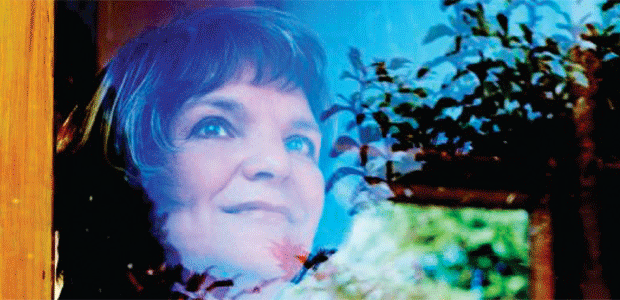Advertisement
Carolyn Thomas, Heart Attack Survivor
Early one morning while out walking, Carolyn Thomas, 58, experienced crushing chest pain. Leaning against a tree gasping for breath, her first thought was, this better not be a heart attack because I do not have time for this. At Emergency, an electrocardiogram (ECG), a treadmill stress test, and blood tests all indicated she was … Continued

Early one morning while out walking, Carolyn Thomas, 58, experienced crushing chest pain. Leaning against a tree gasping for breath, her first thought was, this better not be a heart attack because I do not have time for this.
At Emergency, an electrocardiogram (ECG), a treadmill stress test, and blood tests all indicated she was fine. Embarrassed, she was diagnosed with acid reflux and instructed to see her family doctor in two weeks. In the meantime Thomas flew to Ottawa to visit her mother. While away, she suffered several severe bouts of “acid reflux?including several on her return flight to Victoria—but she didn’t seek help.
After arriving home, she waited until the next morning to go back to Emergency; this time she was diagnosed with a heart attack.
Looking back, Thomas says her stoic behaviour now seems “insane.” Unfortunately, Thomas’s actions are not unique. Many women delay seeking treatment when suffering a heart attack (see “Treatment-Seeking Delay” below).
Change of pace
As a runner for 19 years, a cyclist and gym enthusiast, a volunteer on the board of directors of several organizations, and a gospel choir member, slowing down has been difficult for Thomas. She has been unable to return to her job as communications coordinator for Victoria Hospice since she suffered her heart attack in May 2008.
Since her first pregnancy in the 1970s, Thomas has been on medication to control high blood pressure. She watched her diet, exercised regularly, and assumed everything was fine—until her heart attack.
Change of focus
Education Thomas’s first step on her road to recovery was to educate herself about heart disease.
Her life changed when she attended the four-day WomenHeart Science & Leadership Symposium at the Mayo Clinic in Rochester, Minnesota—the first and only Canadian accepted to attend.
The symposium teaches female heart-attack survivors about the prevention, diagnosis, and treatment of heart disease—from a woman’s perspective. All costs are covered by WomenHeart.
Participants, known as Heart Sisters, (myheartsisters.org) agree to return home and spend 24 volunteer hours sharing their newfound knowledge with other women.
After returning to Victoria, “nobody was safe,” Thomas says with a laugh. “If I sat next to you at the bus stop, you’d learn everything you ever wanted to know about heart disease. I had to learn to tone that down.”
Pinot and prevention
To make her knowledge more palatable, Thomas holds Pinot and Prevention Parties. She held her first one on a cold, rainy November night at a friend’s home. Twenty-one women showed up dressed in red, ate heart-healthy appetizers, and drank a glass of pinot noir while she spoke about heart disease.
“I’m telling women to pay attention to their own bodies and, like one of the Mayo Clinic cardiologists said, don’t be embarrassed to death to seek medical help,” says Thomas.
Fatigue limits her to holding only one party a week.
Diet
Another step on her road to recovery is following the Mediterranean diet. Thomas eats fruits and vegetables, fatty fish such as salmon and sardines, very little red meat, and plenty of whole grains—with the occasional indulgence of dark chocolate and red wine.
While she takes prescribed, conventional medications everyday, Thomas also heeds the Mayo Clinic’s advise to heart attack survivors and takes a multivitamin along with omega-3 and vitamin D supplements each day.
Exercise
At first Thomas could walk only a block, but she gradually increased her distance by a block a week. She now walks for an hour a day and gets out every day, rain or shine, with her pedometer.
“It’s funny,” Thomas says, “but the world has shrunk down to what’s right in front of me today, which sounds bad, but it really isn’t.”
Self-awareness
Thomas advises other heart attack survivors to not be in “a big hurry, really give yourself time to regain your health, and then address the things you’ve identified that contributed to your heart attack.”
She views her heart attack as “a huge wake-up call”. If you’re a woman over 55, heart disease is the number one cause of death in Canada.
Many of her friends still live the busy life she used to lead, and she acknowledges how hard it is for women to slow down. Thomas says, “Don’t wait to have a heart attack before you start rethinking how you’re living your life.”
Treatment-seeking delay
Researchers at the Oregon Health & Science University tried to determine why women delay seeking help, often at great cost to their health. They spoke with 52 women who had experienced heart attacks, and identified several different responses that women had to their attacks. These responses ranged from knowing that something was wrong and taking action, to minimizing the experience and trying to ignore the symptoms.
Researchers call the appropriate response when having a heart attack “knowing and going.” The best course of action is to
- recognize something is wrong
- seek medical help
- act quickly
Many women minimize their pain. Why don’t they seek help promptly? Like Thomas, they may
- not want to be a bother
- fail to recognize the symptoms of a heart attack
- feel embarrassment at calling 911 in case it’s not a real emergency
- not want to lose control of the situation




